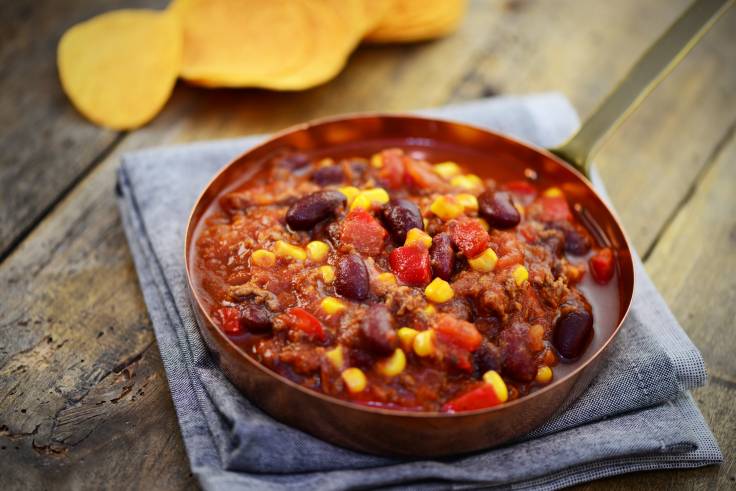Connect with a verified veterinarian in minutes. Licensed vets are available 24/7 to answer your questions. No need to worry about your furry family member.
Do you love the hot taste of chili and other spicy foods? If so, you’re not alone. Many cuisines around the world feature hot and spicy flavors, chili, and more.
Chances are if your dog sees you eating chili, he will beg for a bite, too! But can dogs eat chili?
Has your dog eaten chili? Are you worried the chili will make your dog sick? If so, you’ve come to the right place. We understand it can be scary when your dog eats something like this.
We’ve gathered information about chili and whether it can make a dog sick. Let’s get started!
What is Chili?
Chili is a type of pepper that is a fruit of the Capsicum pepper plant. There are many varieties of pepper plants, and they’re known for producing fruit that has a hot flavor. The plants are members of the nightshade family and are related to bell peppers and tomatoes. Other varieties of pepper plants include cayenne and jalapeno.
Chilis are most often used as a spice or flavoring for a wide range of dishes. They can be dried and powdered or cooked.
What Makes Chilis Taste Hot?
The clue to what makes chilis taste hot is in the name of the plant, Capsicum. Capsicum, also called capsaicin, is a compound contained in chilis. This compound gives the fruit its hot taste. As well as being a great way to add flavor, chilis also have medicinal value.
Along with all the nutrients found in chilis, they also help with various health issues, including pain, weight loss, and more.
While chili can be healthy for humans, what about dogs? Can dogs eat chili?

Review symptoms, medications & behavior to keep your pets healthy with a Vet Online in just minutes.
Ask a Vet Live NowChili & Dogs
Dogs do have a much better sense of smell than we do; however, they don’t have as many taste buds as we do. We have about 9,000 taste buds, while dogs have about 1,700. This means dogs are not able to taste as many flavors as we can.
Dogs can taste food that’s sweet, sour, bitter, and salty. When it comes to spicy foods, dogs aren’t able to taste bitter, spicy flavors.
What’s more, spicy food can be dangerous to dogs. Chilis can cause a burning sensation in a dog’s mouth and throat. Dogs may also experience vomiting, diarrhea, and other unpleasant symptoms after eating chilis.
In addition, dishes that contain chilis often contain onions and garlic, which are highly toxic to dogs.
Symptoms of Chili Ingestion in Dogs
You may notice these symptoms if your dog has eaten chili:
- Nausea
- Vomiting
- Diarrhea
- Stomach pain
- Dehydration
- Burning in the mouth, throat, or stomach
- Coughing/sneezing
- Gagging or dry heaving
- Pawing at face or mouth
- Foaming at the mouth
- Excessive drooling
- Excessive gas
- Increased thirst
If you notice any of these symptoms in your dog, call the vet right away. While this may not be an emergency, there’s a chance your dog could feel very badly. Capsaicin is a powerful irritant. And there’s a chance the vomiting and diarrhea could cause dehydration.
Treatment of Chili Ingestion in Dogs
Depending on your dog’s symptoms, the vet may induce vomiting and give your dog activated charcoal. They will also give your dog medications to treat other symptoms, such as stomach pain. In some cases, your fur baby may require an IV for fluids and to administer medications.
The good news is that with proper treatment, most dogs will make a full recovery! Going forward, it’s essential to keep all chilis and other hot flavorings away from your dog. Never feed him spicy food in the future. You’ll both be happier for it!
Connect with a verified veterinarian in minutes. Licensed vets are available 24/7 to answer your questions. No need to worry about your furry family member.

Julie
Julie is a graduate of the University of North Carolina, Wilmington, where she studied Animal science. Though contrary to the opinion of her parents she was meant to study pharmacy, but she was in love with animals especially cats. Julie currently works in an animal research institute (NGO) in California and loves spending quality time with her little cat. She has the passion for making research about animals, how they survive, their way of life among others and publishes it. Julie is also happily married with two kids.
Review symptoms, medications & behavior to keep your pets healthy with a Vet Online in just minutes.
Ask a Vet Live Now





